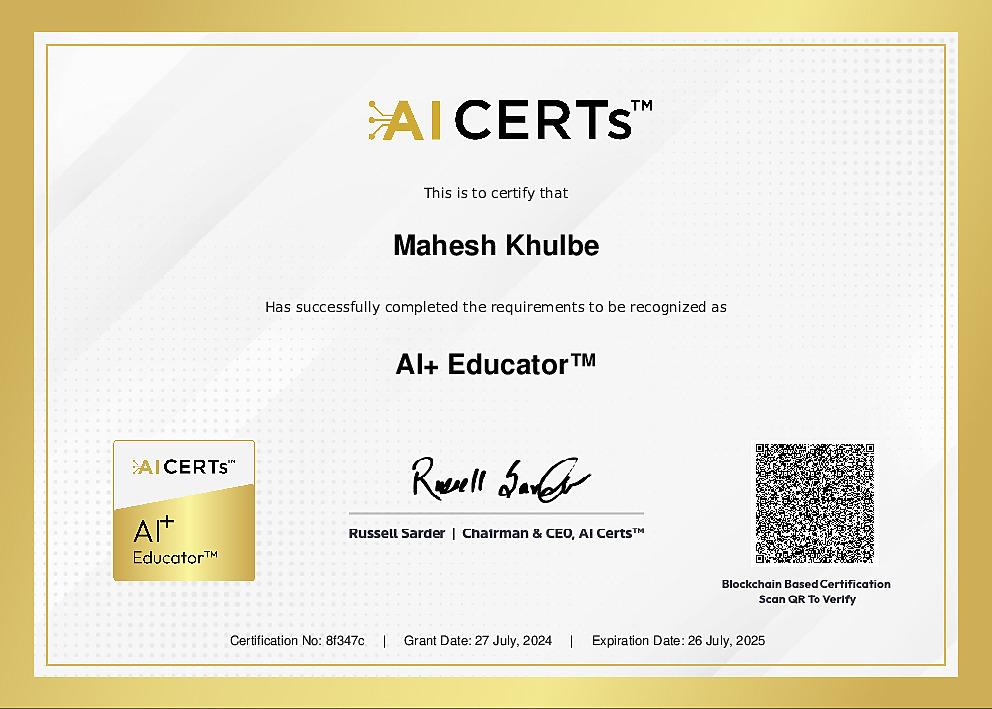AI+ Educator™
AP-410
Future-Proof Your Career with AI+ Educator's Cutting-Edge Certification- Empower Educators: Focuses on AI curriculum design and classroom transformation
- Skill Development: Combines foundational concepts with advanced educational tools
- Practical Tools: Learn to analyse data, promote ethical AI, and design tailored learning
- Future Trends: Stay updated with innovative teaching strategies and AI integration
Why This Certification Matters
At a Glance: Course + Exam Overview
- Instructor-Led: 1 day (live or virtual)
- Self-Paced: 6 hours of content

Who Should Enroll?
Data Scientists: Use AI and quantum computing to analyze and interpret complex datasets.
Software Developers: Learn how to incorporate AI-driven quantum algorithms into software applications.
Mathematicians & Statisticians: Apply AI and quantum techniques to advance mathematical modeling and statistical analysis.
Researchers & Innovators: Explore new ways to apply AI in quantum computing for breakthrough discoveries.
Tech Enthusiasts: Dive into the world of AI and quantum computing to stay ahead in the tech industry.
Industry Growth: Equipping Educators to Lead in AI-Integrated Classrooms
- The global AI-powered automation market is projected to grow at a CAGR of 25.6% from 2023 to 2030. (Source: Market Research Future).
- AI-driven automation is reshaping industries such as manufacturing, retail, and logistics, optimizing efficiency and reducing operational costs.
- The adoption of AI in customer service is skyrocketing, with businesses deploying chatbots and AI-driven platforms to enhance user experiences.
- AI technology is crucial for industries like healthcare and finance, helping in predictive analysis, fraud detection, and personalized services.
- AI is transforming sectors such as education, energy, and agriculture by improving decision-making, resource management, and sustainability efforts.Shape

Skills You’ll Gain
- AI Frameworks (TensorFlow, PyTorch, Scikit-learn)
- Cloud Computing (AWS, Google Cloud, Azure)
- Reinforcement Learning, Data Preprocessing
- API Integration
What You'll Learn
- Course Introduction
- 1.1 Fundamentals of AI
- 1.2 AI in Education Today
- 1.3 Impact and Future Prospects of AI
- 2.1 AI-Driven Personalized Learning
- 2.2 AI Tools for Engagement
- 2.3 Implementing AI Strategies
- 3.1 AI Ethics in Education
- 3.2 Addressing AI Bias
- 3.3 AI and Environmental Sustainability
- 4.1 Curriculum Planning with AI
- 4.2 Interactive AI Modules
- 4.3 AI in Student Assessment
- 5.1 Streamlining Operations
- 5.2 AI for Student Services
- 5.3 Data Management and Analysis
- 6.1 Fundamentals of Data Literacy
- 6.2 Data Analysis in Education
- 6.3 Data-Driven Decision Making
- 7.1 Revolutionizing Assessments
- 7.2 Automated Grading Systems
- 7.3 Personalized Learning Paths
- 8.1 Exploring AI Tools
- 8.2 Practical Exercises
- 8.3 Evaluating AI Tool Effectiveness
- 1. Understanding AI Agents
- 2. Case Studies
- 3. Hands-On Practice with AI Agents
Tools You’ll Master

ChatGPT

Eduaide

GradeScope

Classtime
Prerequisites
- Basic understanding of educational theories and practices.
- Familiarity with digital tools and educational technology.
- Some experience in lesson planning and curriculum design.
- Interest in the potential and application of AI in education.
Exam Details
Duration
90 minutes
Passing Score
70% (35/50)
Format
50 multiple-choice/multiple-response questions
Delivery Method
Online via AI proctored exam platform (flexible scheduling)
Exam Blueprint
- Foundations of Artificial Intelligence (AI) in Education - 10%
- AI in Classroom Teaching and Learning - 15%
- Ethical, Bias, and Sustainability Issues in AI - 20%
- AI and Curriculum Integration - 15%
- AI for Administrative Efficiency - 10%
- Data Literacy and AI - 15%
- AI-Enhanced Assessment and Feedback - 10%
- AI Tools and Hands-on Experience - 5%
Choose the Format That Fits Your Schedule
What’s Included (One-Year Subscription + All Updates):
- High-Quality Videos, E-book (PDF & Audio), and Podcasts
- AI Mentor for Personalized Guidance
- Quizzes, Assessments, and Course Resources
- Online Proctored Exam with One Free Retake
- Comprehensive Exam Study Guide
Instructor-Led (Live Virtual/Classroom)
- 1 Day Instructor-Led (Live Virtual/Classroom)
- Real-time Q&A and peer collaboration
- Led by AI Certified Trainers and delivered through Authorized Training Partners
Self-Paced Online
- ~6 hours of on-demand video lessons, e-book, and podcasts
- Learn anywhere, anytime, with modular quizzes to track progress
Discover Your Ideal Role-Based Certifications and Programs!
Not sure which certifications to go for? Take our quick assessment to discover the perfect role-based certifications and programs tailored just for you.
Get CertifiedFrequently Asked Questions
Educators with a basic understanding of educational theories, digital tools, and curriculum design should enroll.
Educators will learn to integrate AI into teaching, develop AI-enhanced curricula, and address ethical concerns, keeping them updated on AI trends.
Yes, the certification includes practical exercises such as simulations, problem-solving activities, and projects, with opportunities to evaluate AI tools.
Educators will learn to create AI-infused subjects, develop interactive AI modules, use AI-assisted grading, and implement data-driven decision-making.
Content is regularly updated based on advancements in AI technologies and feedback from certified educators.

